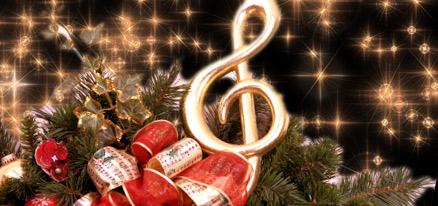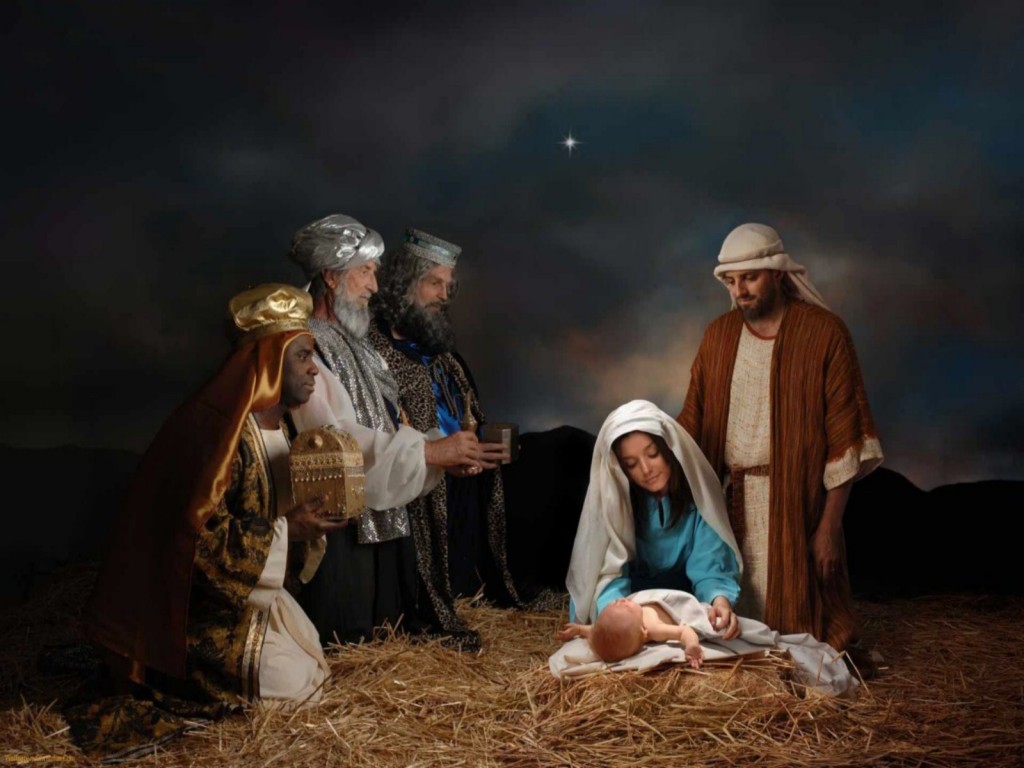Notes on the Notes – December 24, 2020

Christmas Eve
“No Crowded Eastern Street” (VU #49)
“No crowded eastern street, no sound of passing feet;
Far to the left and far to right the prairie snows spread fair and white;
Yet still to us is born tonight the child, the King of glory.
No blaze of heavenly fire, no bright celestial choir,
Only the starlight as of old, crossed by the planes’ flash, red and gold;
Yet still to us is born tonight the child, the King of glory.
No kings with gold and grain, no stately camel train:
Yet in his presence all may stand with loving heart and willing hand;
For still to us is born tonight the child, the King of glory.“
The words of this hymn show us that the events of Christmas transcend time and distance. The text and music reflect the landscape of the Canadian Prairies in winter, conveying the Christmas story in this uniquely Canadian setting. Frieda Major wrote the text as a poem in Winnipeg in 1958. Robert Fleming later wrote the music for The Hymn Book (1971).
“Come and Behold Him” (Worship team)
“Come and behold Him, come see His glory;
Come with an honest heart to see all He is.
We will discover all of His beauty,
His light will burn away all the darkness we’ve known.

Come and behold Him, come and behold Him,
Come with an honest heart to see all He is.
Come and behold Him, wait now before Him,
Come with an honest heart to see all He is.”
Our opening anthem is based on Psalm 95:6 – “Come, let us bow down in worship, let us kneel before the Lord our Maker.” The song was written by John Chisum and George T. Searcy, Jr. and arranged by Camp Kirkland (1994).
“Now Mary Walked That Dusty Road” (tune: “Twas in the Moon of Wintertime”)
“Now Mary walked that dusty road, the way to Bethlehem;
The days and nights were, oh, so long, the cold surrounded them;
But, with each step, she knew the day was coming when they both would say,
“Jesus, our child is born, Jesus is born; in excelsis gloria!”
Our Joseph, he kept careful watch, yes, strength was is his arm;
As hour by hour, he walked with her, made sure nothing would harm
His wife-to-be, the child-within, this father’s love would soon begin –
“Jesus, our child is born, Jesus is born; in excelsis gloria!”
The new words for this famous tune were written by United Church of Canada Moderator, Right Rev. Richard Bott.
“What Child is This” (VU #74 v.1)
“What child is this, who laid to rest, on Mary’s lap is sleeping?
Whom angels greet with anthems sweet while shepherds watch are keeping?
This, this is Christ the King, whom shepherds guard and angels sing;
Haste, haste to bring him laud, the Babe, the Son of Mary!“
The lyrics of this hymn were written in 1865 by William Chatterton Dix. He was one of more than 20 lyricists who chose the traditional melody of Greensleeves as the music for his verse. In the era while Dix was writing hymns and raising a family, Christmas was not the celebration it is today. Neither was it a season where many openly celebrated the birth of Christ. Puritan groups feared that if set aside as a special day, Christmas would become a day of pagan rituals more than a very serious time of worship. In this context, it was unusual for Dix to feel moved to write about Christ’s birth, since many hymn writers of the period ignored Christmas altogether.”
Watch The Gardiner Sisters at: https://yout-u.be/bg0-n47JQFM
“See Amid the Winter’s Snow“ (VU #76)
See amid the winter’s snow, born for us on earth below,
See, the tender Lamb appears, promised from eternal years.
Hail, thou ever-blessed morn; hail, redemption’s happy dawn;
Sing through all Jerusalem, Christ is born in Bethlehem.
Say, ye holy shepherds, say what your joyful news today;
Wherefore have ye left your sheep on the lonely mountain steep?
Hail, thou ever-blessed morn; hail, redemption’s happy dawn;
Sing through all Jerusalem, Christ is born in Bethlehem.
“As we watched at dead of night, lo, we saw a wondrous light;
Angels singing ‘Peace on earth’ told us of the Saviour’s birth.”
Hail, thou ever-blessed morn; hail, redemption’s happy dawn;
Sing through all Jerusalem, Christ is born in Bethlehem.“
“See, amid the Winter’s Snow” is an English Christmas carol. It was written by Edward Caswall (1814–1878), with music composed by Sir John Goss (1800–1880), and published in 1871. It was selected to be included in “Christmas Carols Old and New” as one of the carols that had “proved their hold upon the popular mind”.
See a choral arrangement of the carol at: https://youtu.be/Iq7DmpEMZR8
Hear the Cambridge Choir of King’s College at: https://youtu.be/fPgo-UfyJgc
“O Holy Night” (Praise singers)
“O holy night! The stars are brightly shining,
It is the night of the dear Savior’s birth!
Long lay the world in sin and error pining
Till he appear’d and the soul felt its worth.
A thrill of hope the weary soul rejoices
For yonder breaks a new and glorious morn!
Fall on your knees.
Oh hear the angel voices.
Oh night divine
Oh night when Christ was born.
Oh night, O holy night. O night divine!
Truly He taught us to love one another
His law is love and His gospel is peace
Chains shall He break for the slave is our brother
And in His name all oppression shall cease
Sweet hymns of joy in grateful chorus raise we,
Let all within us praise His holy name
Christ is the Lord,
Oh, praise His name forever!
His power and glory evermore proclaim!
His power and glory evermore proclaim!
“O Holy Night” (also known as “Cantique de Noël”) is a well-known Christmas carol composed by Adolphe Adam in 1847 to the French poem “Minuit, chrétiens” (Midnight, Christians) by poet Placide Cappeau (1808–1877). The carol reflects on the birth of Jesus as humanity’s redemption. In Roquemaure at the end of 1843, the church organ had recently been renovated. To celebrate the event, the parish priest persuaded poet Placide Cappeau, a native of the town, to write a Christmas poem. Soon afterwards that same year, Adolphe Adam composed the music. The song was premiered in Roquemaure in 1847 by the opera singer Emily Laurey. “O Holy Night” is also famous for being the first Christmas song ever played live over the radio. In 1906 Reginald Fessenden ( a former employee and lab technician for Thomas Edison) transmitted a short broadcast from the Brant Rock radio tower. This broadcast included Fessenden himself reading verses from the gospel of Luke and with him playing the violin to “O Holy Night” while singing the last verse, live. Thus giving this Christmas Carol the honour of the first Christmas song ever played across the radio. From the Brant Rock radio tower the Christmas Eve broadcast was heard as far away as Norfolk, Virginia. A re-broadcast on New Year’s Eve allowed the song to be heard as far away as the West-Indies.
See Luciano Pavarotti and Placido Domingo perform the carol in Vienna in 1999.
“Silent Night” (Praise Singers)
“Silent night! Holy night!
All is calm, all is bright
Round yon virgin mother and child.
Holy infant so tender and mild,
Sleep in heavenly peace, sleep in heavenly peace.
Silent night! Holy night!
Shepherds quake at the sight;
Glories stream from heaven afar;
Heavenly hosts sing Hallelujah,
Christ the Saviour is born, Christ the Saviour is born.
Silent night! Holy night!
Son of God, love’s pure light;
Radiant beams from thy holy face,
With the dawn of redeeming grace,
Jesus, Lord, at thy birth. Jesus, Lord, at thy birth.”
Hear John Denver tell the story of Silent Night during the singing of the song with the Muppets and children in the audience during their Christmas special:
See Lindsey Stirling perform the song at: https://www.youtube.com/watch?v=QmvwWxzg3lc
See the Three Tenors at: https://www.youtube.com/watch?v=WjhVI4Q0Vfc
“In the Bleak Midwinter” (VU #55)
“In the bleak midwinter, frosty wind made moan,
Earth stood hard as iron, water like a stone;
Snow had fallen, snow on snow; snow on snow
In the bleak midwinter,long ago.
Our God, heaven cannot hold him, nor earth sustain;
Heaven and earth shall flee away when he comes to reign;
In the bleak midwinter a stable place sufficed
The Lord God almighty, Jesus Christ.
Enough for him, whom cherubim worship night and day,
A breast full of milk, and a manger full of hay.
Enough for him, whom angels fall down before,
The ox and ass and camel which adore.
What can I give him, poor as I am?
If I were a shepherd I would bring a lamb,
If I were a wise man I would do my part;
Yet what I can I give him—give my heart.“
In 1872, poet Christina Rossetti imaginatively placed the holy birth not in warm Bethlehem, but in her chillier and snow-bound native England. Her poem first appeared as a hymn with Gustav Holst’s setting in 1906.
See Quire Cleveland perform the carol:
“A Communion of Carols” (Praise Singers)
“O come, let us adore Him,
O come, let us adore Him,
O come, let us adore Him,
Christ the Lord.
Away in a manger, no crib for a bed,
The little Lord Jesus laid down His sweet head.
The stars in the bright sky look down where He lay,
The little Lord Jesus asleep on the hay.
The first Noel the angel did say,
Was to certain poor shepherds in fields as they lay;
In fields where they lay keeping their sheep,
On a cold winter’s night that was so deep.
Noel, Noel, Noel, Noel,
Born is the King of Israel.
This beautiful medley of carols was arranged by John Purifoy (2011).
“Joy to the World“ (VU #59)
“Joy to the world! The Lord is come: let earth receive her King!
Let every heart prepare him room, and heaven and nature sing,
And heaven and nature sing, and heaven, and heaven and nature sing.
Joy to the earth! The Saviour reigns: let all their songs employ,
While fields and floods, rocks, hills and plains repeat the sounding joy,
Repeat the sounding joy, repeat, repeat the sounding joy.“
The text for this carol is a paraphrase of Psalm 88:4-9. It was written by Isaac Watts and first published in his Psalms of David in 1719.
Enjoy this carol by:
George Fox University Music department: https://youtu.be/6oOwa0CWVVQ
Boys’ choir “Libera” at: http://www.yout-ube.com/watch?v=5IH8A86FLs0
“Angels We Have Heard on High” (VU 38 v. 3)
“Come to Bethlehem and see Christ whose birth the angels sing;
Come, adore on bended knee, Christ, the Lord, the newborn King.
Gloria in excelsis Deo!“
We will be using the third verse of this carol as our benediction response. The carol was first published in 1855.
See Andrea Bocelli sing the carol:


You must be logged in to post a comment.